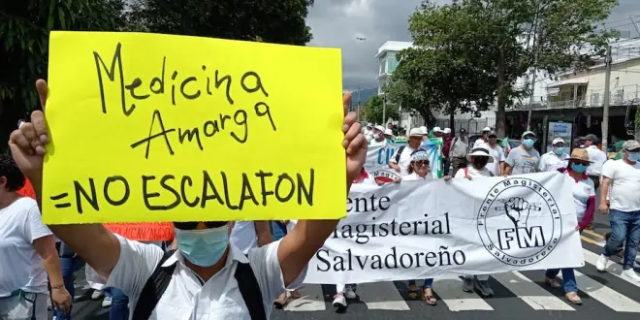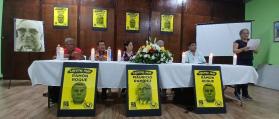Wave of Retaliation Follows Public Sector Union March Against Budget Cuts
Over 60 public sector workers, mostly teachers and healthcare workers, have been fired after an October 19 march denouncing the austerity measures presented in the government’s 2025 budget bill. The bill would eliminate 11,176 public sector positions, adding to the mass layoffs that have occurred throughout Bukele’s presidency. The International Monetary Fund (IMF), with whom Nayib Bukele’s government has been negotiating a $1.3 billion loan, expressed approval for the cuts.
Thousands of workers participated in the march, marking the first major action organized by public sector unions since Bukele took office in 2019. Marchers wore white in reference to the massive “White March” protests led by healthcare workers against attempts to privatize parts of the healthcare system under the right-wing ARENA governments of the late-1990s and early 2000s.
On October 21, FMS Secretary General Idalia Zúniga was fired, the first in a wave of layoffs that is not limited to people who participated in the march. In response to Zúniga’s firing, UN Special Rapporteur on Freedom of Peaceful Assembly and Association Gina Romero tweeted, “I am concerned to learn of the firing of Idalia Zúniga, apparently for her participation a few days ago in #LaMarchaBlanca against proposed budget cuts in health and education... The exercise of freedom of peaceful assembly should not be punished, much less the action of union leaders.”
In addition to Zúniga, 13 other school workers have been fired in the fallout. At least eight of them did not attend the October 19 march. According to Zúniga, “It is not true that we are just being fired for attending the march. The layoffs are coming because the government considers us ‘fat’ that can be trimmed."
The Movement to Defend the Rights of the Working Class (MDTC), a new coalition of unions and civil society groups, reports that at least 50 healthcare workers were also fired, including doctors and nurses from hospitals across the country. In an October 24 press conference, the Dr. Salvador Allende Health Movement decried the illegal nature of the firings. “All these [firings] are characterized by the fact that [the workers] are not notified in writing, only verbally, accompanied by the threat of police force and the use of the state of exception.”
According to the Fired Workers’ Movement (MTD), more than 20,000 public workers were laid off during Bukele’s first term. Since beginning his unconstitutional second term in June, at least 2,500 more workers have been removed from their positions, largely in the Ministry of Culture, municipal governments, and the Legislative Assembly. The MDCT reports 559 union leaders have been fired under Bukele’s governments and more than 50 unions have been eliminated.
Francisco Omar Parada of the Popular Rebellion and Resistance Bloc (BRP), also condemned the retaliation, stating, “We want to express our solidarity with the comrades in the education and health sectors who are being persecuted by this government... We also want to encourage them to continue fighting. We cannot stand idly by in the face of this repression in which you cannot even go out to march because there will be consequences.”
The march was originally convened by an alliance of teachers’ unions and healthcare unions quickly joined the call. Other public sector unions, such as the Women’s Development Institute Union (SISDEMU) also participated, as well as University of El Salvador students and civil society organizations like the National Health Forum. As grassroots momentum supporting the march spread, the teachers’ unions shocked their allies and their own membership by publicly announcing that “the October 19 march is canceled” the day before the event.
In a statement released October 18, the Salvadoran Teachers Alliance, a coalition of seven teachers’ unions, reported that a deal had been reached with the Ministry of Education establishing a permanent roundtable in which their grievances would be heard. With the exception of the Salvadoran Teachers’ Front (FMS), the teachers’ unions withdrew their participation in Saturday’s march, despite lacking any concrete budget commitments from the government.
The surprise move dealt a blow to the march’s attendance, though many teachers did not heed the directive offered by their unions. Following the march, Zúniga celebrated the teachers who still showed up. “We regret the decision of some union leaders who backed down yesterday, but the Teachers' Front is here. I also want to send my solidarity and greetings to the rank and file teachers and SIMEDUCO comrades who were present today.”
The 2025 Budget Bill
In an Independence Day speech, presented to thousands of uniformed soldiers, Bukele unveiled his plan to present a “debt-free” budget for 2025. Released on September 30, the budget bill featured major cuts to more than 70 public institutions, but included increased budgets for the military, as well as Bukele’s communications team. Both of those sectors have already seen their budgets balloon in previous years, fueling Bukele’s elaborate propaganda machine as well as a defense apparatus whose budget has more than doubled since Bukele took office.
The healthcare sector, already facing deteriorating hospital conditions, a medication shortage, and a reduction in specialists, faces cuts of $154 million.
The budget bill also freezes legally-protected pay scales for both healthcare and education workers. In addition, 781 education jobs will be eliminated and the sector faces a $34 million budget reduction. Schools were already facing austerity, as Zúniga explains. “In a school with 1000 students, [the Ministry of Education] gave us $3000 for the whole year.”
Teachers’ union activists, including Zúniga, faced threats before the budget bill. In August, Zúniga was removed from her post as the director of the Republic of Peru school. This followed the arbitrary arrest of Manuel Mira, a leader in the ANDES June 21 union, who was detained under the State of Exception following a supposed complaint to the Ministry of Education. Due process is suspended for all Salvadorans under the State of Exception, in place since March 2022 and the measure has been used to persecute union activists and community leaders.
The IMF has signaled their approval of the austerity measures presented in Bukele’s budget proposal. In an October 3 press briefing, IMF Communications Director Julie Kozack stated, “The recently presented 2025 budget represents a step in strengthening public finances.” The Salvadoran government has been negotiating a $1.3 billion loan with the IMF since 2021 and an August 3 IMF memo called on the Salvadoran government to reduce debt and government spending.
The BPR, the Movement of Regime Victims (MOVIR), and others also marched on October 31, Salvadoran Unionist Day. The date commemorates the 1989 bombing of the National Federation of Salvadoran Workers' Unions (FENASTRAS) headquarters, in which General Secretary Febe Elizabeth Vasquez and eight other union leaders were assassinated. Marchers delivered an alternative budget to the Legislative Assembly that “increases social and productive investment, cuts military spending and government propaganda, and increases tax revenue through progressive tax measures, so that higher income social groups pay more taxes.”
The MDTC has also convened another march for November 23, calling on all unions and civil society organizations to once again protest the layoffs and budget cuts.


 "I am a CISPES supporter because continuing to fight for social justice and a more people-centered country means continuing the dream and sacrifice of thousands of my fellow Salvadorans who died for that vision.” - Padre Carlos, New York City
"I am a CISPES supporter because continuing to fight for social justice and a more people-centered country means continuing the dream and sacrifice of thousands of my fellow Salvadorans who died for that vision.” - Padre Carlos, New York City

